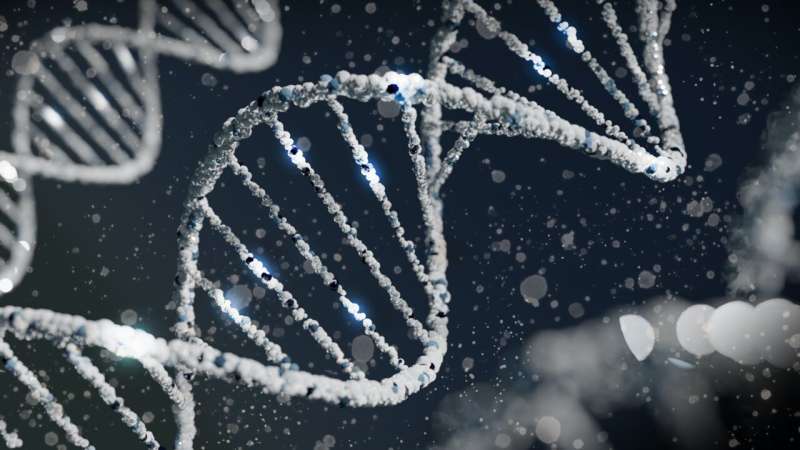This article has been reviewed according to Science X's editorial process and policies. Editors have highlighted the following attributes while ensuring the content's credibility:
fact-checked
peer-reviewed publication
trusted source
proofread
Genes with strong impact on menopause timing also link to cancer risk

New research has found four genes with some of the largest known effects on the timing of menopause discovered to date, providing new insight into links between menopause timing and cancer risk.
Genes come in pairs, and when women only have one working copy of the four new genes identified (ETAA1, ZNF518A, PNPLA8, PALB2), they have menopause between two and five-and-a-half years earlier than average.
The large-scale analysis, titled "Genetic links between ovarian aging, cancer risk and de novo mutation rates," has been published in Nature.
The team first looked at variation in data from genetic sequencing of 106,973 post-menopausal female participants in the UK Biobank study. Researchers focused on rare types of genetic changes which cause a loss of the protein, and investigated their effect on the timing of menopause.
The genetic changes studied are all rare in the population. However, their influence on menopause is five times greater than the impact of any previously identified common genetic variant. The strongest effect was found from gene variants in ZNF518A, only found in one in 4,000 women. These variants shortened reproductive lifespan more than most previously identified genes.
Discovering the effect of the genes gives scientists a better understanding of the biological mechanisms underpinning menopause, and links to other diseases.
Study co-lead Professor Anna Murray, of the University of Exeter Medical School, said, "For decades, menopause has been under-researched, yet now this is a rapidly evolving area of science. The timing of menopause has a huge impact on women as they plan their careers and lives, and understanding the genetic changes is of particular interest in terms of potential treatments that could prolong reproductive life in future."
When unrepaired DNA damage occurs in eggs, they can die. The rate at which eggs are lost determines when women experience menopause. The team's previous work has shown that many genes that influence the timing of menopause are likely to do this by affecting the genetic integrity of eggs.
The same factors affect other cells and tissue types in parallel, and in this new study, the team found that many of the genes linked to menopause timing are also risk factors for cancer. These include changes in the BRCA1 and BRCA2 genes, which result in earlier menopause and also in increased risk of cancer.
This is thought to be the process at play in a fifth new gene linked to menopause timing (SAMHD1). The team discovered that changes in this gene can cause women to go through menopause over a year later than average. The researchers also found for the first time that changes in this gene cause predisposition to various cancers in men and women.
Professor John Perry, co-lead from the MRC Epidemiology Unit at the University of Cambridge added, "Past research suggests the female ovary ages at a faster rate than other organ in the body, and this is a model system for understanding the biology of broader aging.
"Our latest research builds on this concept, demonstrating that studying ovarian aging will not only lead to a better understanding of the biology behind infertility and other reproductive disorders, but will enhance our understanding of fundamental processes that regulate DNA damage and cancer risk in the general population."
Using data from the 100,000 Genomes project, led by Genomics England and NHS England, the team next found that mothers with a high number of genetic variants that cause earlier menopause tended to have more new changes in the DNA they passed onto their children.
The study authors believe this is because the relevant genes are involved in repairing damage to DNA, so this function may be compromised in the ovaries, enabling new genetic changes to occur in the eggs.
Dr. Hilary Martin, a study co-lead from the Wellcome Sanger Institute, said, "New changes to the DNA in the egg or sperm are the source of all genetic variation in humans, contributing to differences between individuals in their appearance, behaviors and risk of disease.
"Until now, we knew very little about what influences these new DNA changes, apart from parental age. This is the first time we've seen that existing common variation in DNA influences the rate of these changes."
More information: Anna Murray, Genetic links between ovarian ageing, cancer risk and de novo mutation rates, Nature (2024). DOI: 10.1038/s41586-024-07931-x. www.nature.com/articles/s41586-024-07931-x




















